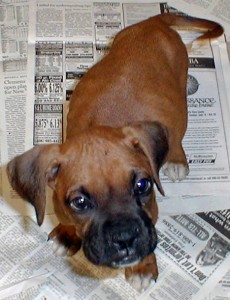Important Puppy Training Tips
 1. Start your training immediately: Ever hear the saying “you can’t teach an old dog new tricks? Well while that’s not exactly true, it is easier in the first 4 months. Puppies start to learn the first time their eyes open, so you need to take advantage of it. Early training will help you raise a well behaved dog!
1. Start your training immediately: Ever hear the saying “you can’t teach an old dog new tricks? Well while that’s not exactly true, it is easier in the first 4 months. Puppies start to learn the first time their eyes open, so you need to take advantage of it. Early training will help you raise a well behaved dog!
2. Use short, focused training sessions: Puppies attention span isn’t that of an older dog. You need to make the sessions short and focused so the puppy’s attention doesn’t wander. Usually 15 minutes in length is the most ideal, and always end on a positive note. Play with the puppy with its favorite toy for 5 minutes after the session to stimulate the training process.
3. When is a good time to train my puppy? : Training a puppy before it eats is very effective, that way the puppy will respond to treats even more than usual. However, don’t always use food as the reward, mix in petting and hugs so the puppy doesn’t always expect food for obeying its master.
4. How do I teach my puppy commands? : Always start your session off by reviewing previously learned commands, if the puppy does well, you can introduce a new one. One new command per session is ideal, I myself focused on one new trick per week to make sure it is retained long term.
5. Hand feeding: I learned this with my Akita, Roscoe. Hand feeding a puppy teaches it to like human contact while feeding. Take a handful of food from the puppies bowl while it eats and feed it by hand, this way the dog doesn’t become dependent on you always doing a hand-feeding as it grows. The purpose of this is to keep a dog from becoming aggressive when people approach them when eating.
6. Take your puppy to the park: Young dogs thrive on the stimulation of new environments and activities. Taking a trip to the dog park is a great way to socialize your dog and let them explore. They need these things to develop properly and you will have a great time watching him frolic!
7. Social, social, social: Have friends over, take a walk around you neighborhood, let him play with the Lab next door, it is all relevant. A dog with the proper amount of socialization will be an absolute joy to you. An un-socialized dog will do things like bark, jump, and nip at guests and that obviously isn’t what you want.
8. Puppy Chewing: Your new friend will definitely chew things. The key is, what will he chew? Reward and praise him for chewing things that are proper (I recommend Kong brand toys), and discipline with a stern “no” when chewing things it isn’t supposed to. Replace the item with an approved chew toy.
9. Housebreaking: Housebreak your puppy early by supervising and recognizing your puppy’s body language (circling or sniffing). Take your puppy out every 45 minutes after eating or drinking as they tend to go around this time. When it goes at the right location, praise and rewards your puppy so that it will associate going outdoors as a positive experience.
10. Punishment and Praise: Whenever your puppy does something right, praise and reward. When they need to be disciplined, use a stern voice and look. Only discipline when you catch the puppy misbehaving, and never hit or scream at your puppy that can make them turn aggressive later in life.
Warning: Trying to access array offset on value of type bool in /home/newgfp/public_html/wp-content/themes/base/includes/social-sharing.php on line 19
